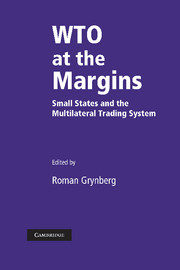Book contents
- Frontmatter
- Contents
- List of figures and appendices
- List of tables
- List of contributors
- Introduction
- Part I Theory and evidence
- 1 A theory of trade and development of small vulnerable states
- 2 Small countries: a survey of the literature
- 3 When comparative advantage doesn't matter: business costs in small economies
- 4 Can small states compete in manufacturing?
- 5 The economics of isolation and distance
- 6 The trade performance of small states
- 7 Small economies and special and differential treatment: strengthening the evidence, countering the fallacies
- Part II WTO and small economies
- Part III WTO dispute settlement
- Part IV Negotiating issues and institutional arrangements
- Index
6 - The trade performance of small states
Published online by Cambridge University Press: 05 May 2010
- Frontmatter
- Contents
- List of figures and appendices
- List of tables
- List of contributors
- Introduction
- Part I Theory and evidence
- 1 A theory of trade and development of small vulnerable states
- 2 Small countries: a survey of the literature
- 3 When comparative advantage doesn't matter: business costs in small economies
- 4 Can small states compete in manufacturing?
- 5 The economics of isolation and distance
- 6 The trade performance of small states
- 7 Small economies and special and differential treatment: strengthening the evidence, countering the fallacies
- Part II WTO and small economies
- Part III WTO dispute settlement
- Part IV Negotiating issues and institutional arrangements
- Index
Summary
Introduction
Recent years have seen intensifying global integration measured by an unprecedented rise in volume of trade and capital flows and a reduction in barriers to worldwide trade and investment activities. This drive to globalisation received substantial impetus from the successful conclusion of the Uruguay Round of Multilateral Trade Negotiations (MTNs) establishing the WTO, providing specific trade rules and procedures, and promising further liberalisation in the world trade regime. Despite these developments there remain serious concerns that some countries have failed to derive significant benefits from the ongoing process of trade liberalisation and globalisation. This is particularly true for small vulnerable states, which are confronted with a number of overriding problems constraining their economic development and have to depend greatly on international trade to overcome these obstacles. It is now becoming increasingly evident that even in this era of globalisation these countries have not been able to prevent their declining relative importance, or marginalisation, in world trade.
Although small states have attracted a large amount of research and many of them are concerned about the problem of marginalisation, there has been little or no attempt to provide firm evidence of it nor explanation of its causes. In fact, the notion of marginalisation in this literature remains unclear and is usually associated with the apprehension of losing out from the multilateral trade liberalisation in the global economy. It is against this backdrop that the present chapter defines marginalisation as the declining relative importance in world trade and uses data and statistical tools to investigate the long-term trends in marginalisation of small states.
- Type
- Chapter
- Information
- WTO at the MarginsSmall States and the Multilateral Trading System, pp. 164 - 226Publisher: Cambridge University PressPrint publication year: 2006



